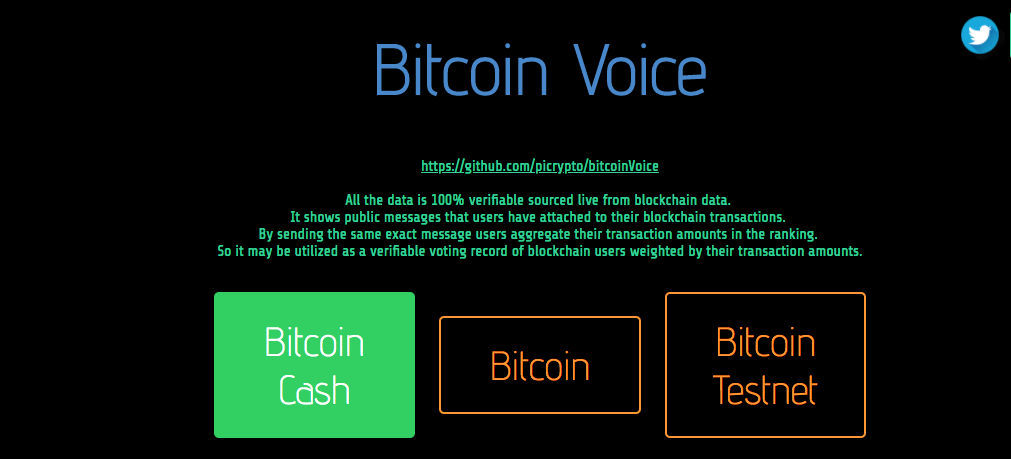Bitcoin protocol voting

Bitcoinocracy is a free and decentralized way to measure the Bitcoin BCH community's stance bitcoin protocol voting a given proposition. Voting requires proof of Bitcoin BCH holdings via cryptographic signature.
Signed votes cannot be forged, and are fully auditable by all users. Bitcoin protocol voting with your Bitcoin BCH signature. Micropayment channels and other tools can help Bitcoin reach all applications for money, without compromising Bitcoin's most valuable properties.
Unlimited blocksize is bad for Bitcoin because it diminishes bitcoin protocol voting to pay fees and in the long term it makes mining unprofitable. Block size limit should be increased to 8 mb as soon as possible. If non-Core hard fork wins, major holders will sell BTC, driving price into the ground. Bitcoin's should not adopt hard-forks except with the widest possible support. RBF Replace-By-Fee policy should NOT be adopted because it breaks 0-conf transactions and needlessly imposes extra development costs on existing merchants.
The status quo is bitcoin protocol voting than BIP Bitcoin Unlimited's path to solve Bitcoin's scaling issues is better than Bitcoin Core's. Segregated Witness is a good short-term approach to scaling Bitcoin capacity. Moderation policy by Theymos removes distractions by poor trolls.
Bitcoin protocol voting one-time increase would be better right now than nothing. We need big block eg: BIP is better than the status quo. Wide consensus doesn't mean anything if it was achieved by censorship. Fungibility is a more pressing problem than scale for Bitcoin. Bitcoin's value depends critically on censorship resistance, monetary sovereignty, and the personal control made possible by decentralisation.
BIP is the implemented and tested solution that gives Bitcoin a chance to scale with respect to the long term technological trends and can be fixed without a new hard fork if they discontinue.

I see a common mistake in many discussions centered around Bitcoin involving voting power. Specifically, many people think that Bitcoin works kind of like a majority voting system, which it kind of does.
In this blogpost, I want to clear up this misconception. The truth is that it is the Bitcoin users who wield ultimate power, and the miners' hashing power has absolutely no say in determining how the protocol evolves. There are two kinds of "voting power" in Bitcoin: The best analogy I can come up with is from soccer: Fans routinely kick out bad management, drive away players and override bad decisions by the seemingly powerful administration, for it is the fans' attention that the administration seeks.
In any case, let's not let too much anthropomorphizing get in the way; that's why most people get trapped into conflating these two concepts in the first place. Technically, there are two kinds of consensus decisions taking place in Bitcoin:. Miners engage in a process by which they append transactions to the end of an append-only log known as the blockchain. For this, they are amply rewarded with 25 BTC per block, plus all the transaction fees in this block.
The process is carefully constructed to enable the majority to form behind a single, unforgeable blockchain. He can engage in behaviors that are not available to minority miners. That's because mining power is different from, and is not at all correlated with, chain power.
The Bitcoin ecosystem consists of many people other than the miners who operate on the blockchain. In particular, every single Bitcoin user, every single person with a wallet, and every single merchant operates on the blockchain.
They store their balances on the blockchain or have an exchange store their balances somewhere on the blockchain. They use the blockchain to check the balances of people who are sending Bitcoins to them.
They validate Bitcoins all the way back to their creation using the blockchain. Miners are part of this group, but they are just like every other user. Collectively, we'll call this group the Bitcoin community. Everyone in the Bitcoin community gets a single vote, no more, no less, on what kind of a blockchain they will accept.
Miners are subservient entities who must follow the decision of the Bitcoin community. They get one vote, along with everyone else. In fact, it is entirely possible for the Bitcoin community to completely change the rules that govern the maintenance of the blockchain, and do so without having any of the miners agree this would be a mistake for political reasons, but the statement holds technically.
The rules are determined entirely by what the buyers and sellers accept as the legitimate blockchain. Miners are subservient followers. To illustrate, suppose that I, for whatever reason, decided to change the blockchain rules so that every new block generated after January 1st, shall have the number 42 at the top of every block. If I see a block after that date that does not have 42 on top, I discard it.
Then we'd just collectively refuse the blocks miners create without the magic number in them. The work that the miners would put into creating nonbearing blocks would be wasted, and their compensation, in Bitcoins, on a blockchain that none of us accept, would be worthless. New miners would emerge who place the magic number on every block, have their blocks recognized, and be able to redeem their block rewards at merchants who recognize the new blocks with 42 on top.
The basic way in which people exercise this power is by respecting, or ignoring, the blockchain. And the vote carries as much weight as what that user has to offer to the rest of the community. If the user is offering to buy a lot of other Bitcoins, or if he's a merchant like Overstock. The core devs working on the reference implementation play a critical role here, because they get to decide the de facto set of rules that everyone abides by.
This is a tremendously empowering situation. Miners derive their income from the buyers and sellers who recognize the blocks they create. This is why the behavior of a misbehaving miner is proscribed -- they could not, for instance, create 10 million Bitcoins out of the thin air, because no one would recognize those new rules. The blockchain is what we all say it is. This is why regular users wield ultimate power in Bitcoin. It is the chain power that determines the shape of the blockchain, not mining power.
Miners are followers, not leaders, in this game. It is critical to keep these distinctions in mind as we think about the true source and distribution of power in the Bitcoin system. There are lots of fuzzy analogies for Bitcoin and I'm guilty of using analogies wherever possible myself, because they do make the discourse more accessible, but they also lead some people astrayand if one's not careful, it's easy to end up conflating mining power, which corresponds to miner speed, with real power, which corresponds to having something people want, like cash to buy Bitcoins with or goods to sell for Bitcoin.
It's the latter that counts and dictates all else. Hacker and professor at Cornell, with interests that span distributed systems, OSes and networking. One person, one vote. Mining Power Miners engage in a process by which they append transactions to the end of an append-only log known as the blockchain. Chain Power The Bitcoin ecosystem consists of many people other than the miners who operate on the blockchain.
Implications This is a tremendously empowering situation.